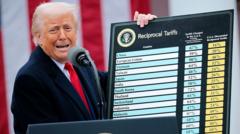In a surprising reversal, Donald Trump announced that smartphones and other electronics will now be subjected to new tariffs, despite earlier exemptions. This move raises concerns among consumers and reiterates increasing tensions in the US-China trade relationship.
Trump Revives Tariff Concerns on Electronics Amidst Ongoing Trade Tensions

Trump Revives Tariff Concerns on Electronics Amidst Ongoing Trade Tensions
Former President Donald Trump signals potential new tariffs on Chinese-made electronics, contradicting recent temporary exemptions and creating uncertainty in the market.
_ _ _
Former President Donald Trump has reignited concerns over tariffs on Chinese-made electronics, including smartphones, just days after a momentary exemption was announced. This unexpected shift has drawn attention away from recent positive movements in European stock markets following the original tariff exemptions.
On Sunday, US officials clarified that while certain electronics would no longer face the previous 125% tariffs, they will now encounter a new "semiconductor tariff". Commerce Secretary Howard Lutnick emphasized the necessity of domestic production of crucial components like semiconductors, tying it directly to national security. This shift in policy underscores Trump's assertion that products are merely moving into a different "Tariff bucket."
Despite recent exemptions that had allowed smartphones and computers to bypass heavy tariffs, Trump took to social media to dispute the reports, reiterating that these products would not escape new levies. He indicated that details regarding semiconductor duties would be disclosed shortly.
In related news, Sony announced a price hike for its PlayStation 5 console across Europe, Australia, and New Zealand, attributing the decision to economic challenges, although it plans to maintain current pricing in the US.
China's Ministry of Commerce has urged Trump to completely withdraw his tariff regime, emphasizing a need for mutual respect in trade relationships. Meanwhile, the administration's fluctuating tariff strategy has rekindled fears of an entrenched trade war, with trade representatives indicating no immediate plans for dialogue between Trump and Chinese President Xi Jinping.
Since April, the US has imposed escalating tariffs on Chinese goods, currently standing at 145%, in retaliation to China's own tariffs that reached as high as 125%. The ongoing tit-for-tat measures have raised apprehensions about the broader implications for global trade and job security.
As the economic landscape continues to shift, experts remain cautious regarding the ultimate impact of these tariffs on both American consumers and the global marketplace.
Former President Donald Trump has reignited concerns over tariffs on Chinese-made electronics, including smartphones, just days after a momentary exemption was announced. This unexpected shift has drawn attention away from recent positive movements in European stock markets following the original tariff exemptions.
On Sunday, US officials clarified that while certain electronics would no longer face the previous 125% tariffs, they will now encounter a new "semiconductor tariff". Commerce Secretary Howard Lutnick emphasized the necessity of domestic production of crucial components like semiconductors, tying it directly to national security. This shift in policy underscores Trump's assertion that products are merely moving into a different "Tariff bucket."
Despite recent exemptions that had allowed smartphones and computers to bypass heavy tariffs, Trump took to social media to dispute the reports, reiterating that these products would not escape new levies. He indicated that details regarding semiconductor duties would be disclosed shortly.
In related news, Sony announced a price hike for its PlayStation 5 console across Europe, Australia, and New Zealand, attributing the decision to economic challenges, although it plans to maintain current pricing in the US.
China's Ministry of Commerce has urged Trump to completely withdraw his tariff regime, emphasizing a need for mutual respect in trade relationships. Meanwhile, the administration's fluctuating tariff strategy has rekindled fears of an entrenched trade war, with trade representatives indicating no immediate plans for dialogue between Trump and Chinese President Xi Jinping.
Since April, the US has imposed escalating tariffs on Chinese goods, currently standing at 145%, in retaliation to China's own tariffs that reached as high as 125%. The ongoing tit-for-tat measures have raised apprehensions about the broader implications for global trade and job security.
As the economic landscape continues to shift, experts remain cautious regarding the ultimate impact of these tariffs on both American consumers and the global marketplace.




















